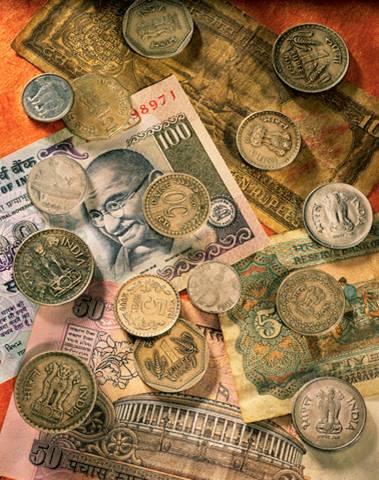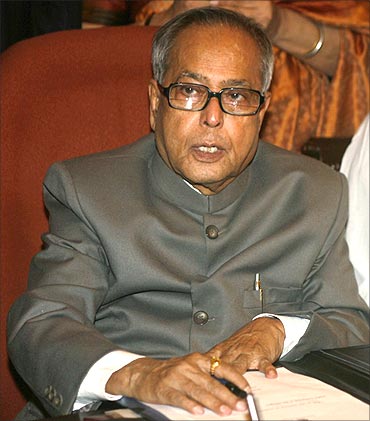Neha Pandey in Mumbai
Since the finance minister has brought down the qualifying age of senior citizens from 65 to 60 years, financial planners, such as Forefront Capital Management's Radhika Gupta, have been fielding questions from their clients on how to take advantage of the situation.
"Those above 60 and below 65 years want to know the impact of the Budget proposal on their investments and savings," says Gupta.
Tax saving
From the saving point of view, a person at 60 (male) will now save Rs 70,000 more. Earlier, while the retirement age of a person was 60 years, the tax benefits came only at the age of 65.
. . .
Budget: How good is it for senior citizens?
Image: Pranab Mukherjee.Photographs: Reuters
Until now, your tax would be calculated on Rs 160,000 (raised to Rs 180,000 in Budget 2011-12) and you would qualify for the Rs 240,000 slab only after the age of 65.
The slab was increased by Rs 10,000 to Rs 250,000.
Therefore, a male aged between 60 and 64 would have paid Rs 14,420 (tax slab = Rs 160,000), for an income of Rs 300,000.
Now, since the age for senior citizens is 60 years, he will have to pay Rs 5,150.
Saving = Rs 9,270.
If the qualifying age for senior citizen had remained unchanged, the tax slab would have been Rs 180,000 (tax = Rs 12,360).
For female senior citizens (aged between 60 and 65), the savings would be Rs 6,180.
If you invest in instruments exempted under Section 80C of the Income Tax Act, you can lower you tax liability further.
. . .
Budget: How good is it for senior citizens?
Investment
Ideally, the finance ministry should not have an impact on a senior citizen's investment planning.
"We prefer conservative investment planning for individuals above 50.
And, this is tightened slightly more on retirement," says Abhinav Angirish of Abchlor Investments.
Angirish favours fixed deposits, as these are giving high returns.
State Bank of India's one-year deposit is returning 7.75 per cent, but the post-tax returns will work out to be less than seven per cent.
Typically, bank fixed deposits offer a 0.5-1 per cent higher rate of interest to investors at 60 and above. But those below 65 would get taxed on the returns, wiping out benefits.
However, special deposits of 555 and 1,000 days will fetch senior citizen 0.25 per cent extra.
. . .
Budget: How good is it for senior citizens?
Most investment consultants say the best route is still government savings schemes or senior citizen savings schemes of banks and the post office, given the profile of a retired person (risk-averse).
And, these schemes can fetch returns as high as nine per cent.
Although the interest income is taxable, they prefer safety and regular inflow of cash.
However, if one has the cushion of pension or substantial savings, riskier investments can be contemplated.According to Gupta, those above 60 years could invest up to 20 per cent in equities (preferable balanced funds that have up to 65 per cent exposure to equity and the remaining in debt), in the dividend option, as a regular income is the primary requirement for the retired.
. . .
Budget: How good is it for senior citizens?
A systematic withdrawal plan is another problem. And, capital gains for holding period of over one year is zero.
Another 55-60 per cent can be invested in debt instruments, such as fixed maturity plan and debt mutual funds.
"From the perspective of post-tax returns, a 12-15 month FMP is advisable only if you don't need the money for that tenure. Otherwise, fixed deposits are a liquid option," she says.
Long-term FMPs (over one-year) are giving anywhere between 9.5-9.9 per cent.
FMPs get indexation benefit when held for over a year -- 10 per cent without indexation and 20 per cent with indexation.
. . .
Budget: How good is it for senior citizens?
When sold within one year, gains are added to your income and taxed. Fixed deposits of over five years are exempted from tax. And, the remaining 20 per cent could be invested in gold.
Some anomalies
The Budget proposal is only limited to change in tax slabs for senior citizens. So far, the benefits under Section 80D will be allowed only if it is for someone above 65 years.
Under this section, the Income Tax department provides benefits for children who are paying premiums for their parents (up to Rs 20,000) and this kicks in only after 65 years.
Similarly, under Section 80DDB, you can be exempted (up to Rs 60,000) for medical treatment of a kin who is a senior citizen. However, it will be applicable if the kin is 65 years and above.









article